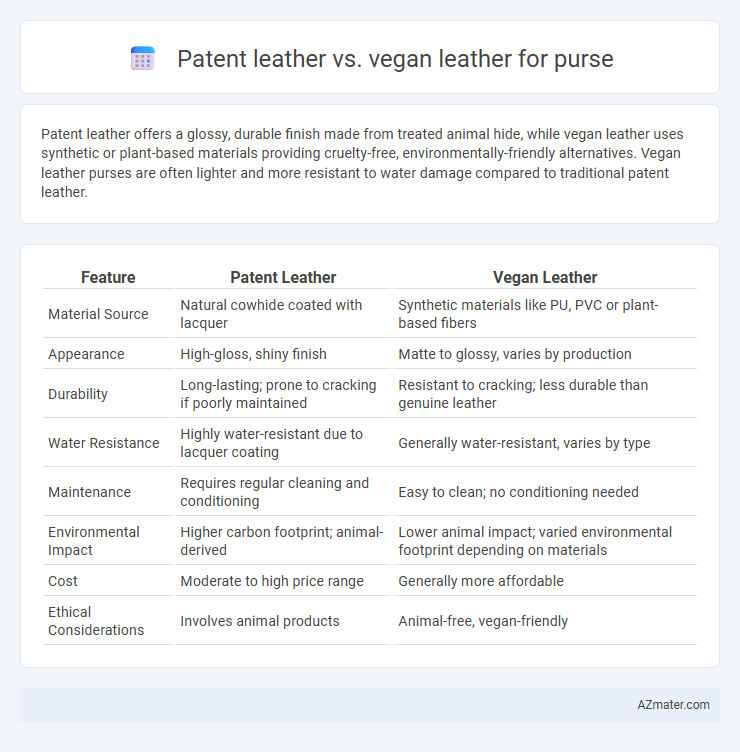Patent leather offers a glossy, durable finish made from treated animal hide, while vegan leather uses synthetic or plant-based materials providing cruelty-free, environmentally-friendly alternatives. Vegan leather purses are often lighter and more resistant to water damage compared to traditional patent leather.
Table of Comparison
| Feature | Patent Leather | Vegan Leather |
|---|---|---|
| Material Source | Natural cowhide coated with lacquer | Synthetic materials like PU, PVC or plant-based fibers |
| Appearance | High-gloss, shiny finish | Matte to glossy, varies by production |
| Durability | Long-lasting; prone to cracking if poorly maintained | Resistant to cracking; less durable than genuine leather |
| Water Resistance | Highly water-resistant due to lacquer coating | Generally water-resistant, varies by type |
| Maintenance | Requires regular cleaning and conditioning | Easy to clean; no conditioning needed |
| Environmental Impact | Higher carbon footprint; animal-derived | Lower animal impact; varied environmental footprint depending on materials |
| Cost | Moderate to high price range | Generally more affordable |
| Ethical Considerations | Involves animal products | Animal-free, vegan-friendly |
Introduction: Defining Patent Leather and Vegan Leather
Patent leather is a type of leather coated with a high-gloss finish, known for its smooth, shiny surface and durability in fashion accessories like purses. Vegan leather, also called faux or synthetic leather, is made from non-animal materials such as polyurethane or plant-based sources, offering an animal-friendly and environmentally conscious alternative. Both materials serve distinct style and ethical preferences, impacting the choice of purses based on appearance, texture, and sustainability.
Material Composition: What Makes Each Unique
Patent leather is a type of coated leather that features a high-gloss finish achieved by applying a lacquer or varnish over genuine animal hide, providing durability and a shiny, polished appearance. Vegan leather, also known as faux leather, is typically made from synthetic materials such as polyurethane (PU) or polyvinyl chloride (PVC), or from natural alternatives like cork or pineapple leaves, offering an animal-free and often more environmentally sustainable option. The core distinction lies in patent leather's natural protein-based composition enhanced by a glossy coating versus vegan leather's synthetic or plant-based polymers designed to mimic the look and feel of genuine leather without animal products.
Aesthetic Appeal: Shine, Texture, and Color Options
Patent leather offers a high-gloss shine and smooth texture, creating a classic, polished aesthetic that enhances luxury purses. Vegan leather varies in finish, with options ranging from matte to shiny, often featuring unique textures like pebble grain or metallic sheens, catering to diverse style preferences. Color options for patent leather tend to be limited to traditional shades, while vegan leather provides a broader palette, including vibrant and unconventional hues, appealing to fashion-forward consumers.
Durability and Longevity Comparison
Patent leather offers high durability due to its thick, glossy finish made from natural animal hides, making purses resistant to water and scratches, which contributes to extended longevity. Vegan leather, typically crafted from polyurethane or plant-based materials, varies in durability but often lacks the resilience of patent leather, especially under prolonged exposure to heat and moisture, leading to wear and peeling over time. For purses, patent leather generally ensures longer-lasting use, while vegan leather prioritizes ethical considerations and requires more careful maintenance to maximize lifespan.
Weight and Flexibility: How Each Feels
Patent leather is heavier and stiffer, providing a glossy, structured feel that maintains its shape well but can be less comfortable for extended wear. Vegan leather, made from polyurethane or plant-based materials, is lighter and more flexible, offering a softer touch and greater ease of movement, making it more comfortable for everyday use. The choice between the two depends on preference for durability and aesthetics versus comfort and weight.
Maintenance and Cleaning Requirements
Patent leather purses require minimal maintenance due to their glossy, sealed surface that resists stains and can be cleaned with a damp cloth to remove dirt or scuffs. Vegan leather purses vary in composition, often needing gentle cleaning with mild soap and water or specialized leather wipes to avoid cracking or peeling over time. Both materials benefit from avoiding prolonged exposure to extreme heat and direct sunlight to maintain appearance and durability.
Environmental Impact and Sustainability
Patent leather, made from traditional animal hides, involves intensive chemical treatments that contribute to significant environmental pollution and resource depletion. Vegan leather, typically produced from polyurethane or innovative plant-based materials like pineapple leaves and mushroom fibers, offers a more sustainable alternative by reducing reliance on animal agriculture and minimizing carbon emissions. Choosing vegan leather purses supports eco-friendly manufacturing practices and promotes reduced waste and biodegradability, aligning with growing environmental consciousness.
Ethical Considerations: Animal Welfare and Cruelty-Free
Patent leather, derived from animal hides, raises ethical concerns due to the environmental impact and animal welfare issues associated with livestock farming and leather processing. Vegan leather, made from synthetic or plant-based materials, offers a cruelty-free alternative that eliminates animal suffering and reduces the demand for animal agriculture. Choosing vegan leather purses supports ethical fashion by promoting sustainability and protecting animal rights.
Price Point and Accessibility
Patent leather purses generally come at a higher price point due to the use of genuine animal hide and a labor-intensive finishing process that creates their glossy surface. Vegan leather purses tend to be more affordable, made from synthetic or plant-based materials that allow for mass production and wider accessibility. Consumers seeking budget-friendly and cruelty-free options often prefer vegan leather, which is readily available across various retail outlets.
Choosing the Right Leather for Your Purse
Patent leather offers a glossy, durable finish ideal for formal purses, providing water resistance and long-lasting shine. Vegan leather, made from synthetic or plant-based materials, appeals to eco-conscious consumers seeking cruelty-free, lightweight, and affordable alternatives. When choosing the right leather for your purse, consider factors like durability, maintenance, environmental impact, and style preferences to match your lifestyle and ethical values.

Infographic: Patent leather vs Vegan leather for Purse
 azmater.com
azmater.com